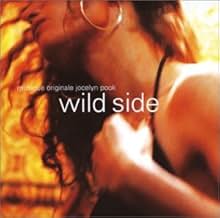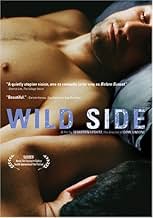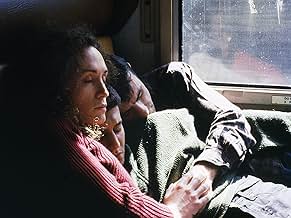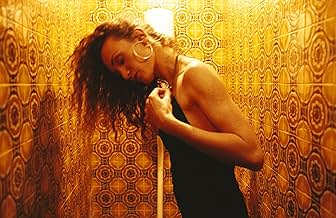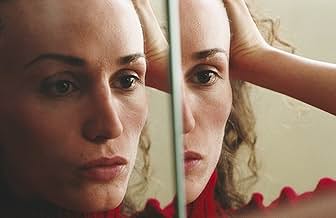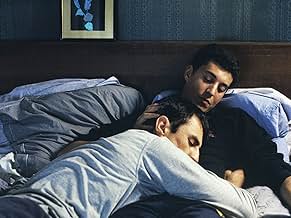IMDb RATING
6.4/10
1.2K
YOUR RATING
A transgender woman who survives prostituting herself in Paris, returns - with her two male lovers in tow - to her family home in the countryside to look after her dying mother.A transgender woman who survives prostituting herself in Paris, returns - with her two male lovers in tow - to her family home in the countryside to look after her dying mother.A transgender woman who survives prostituting herself in Paris, returns - with her two male lovers in tow - to her family home in the countryside to look after her dying mother.
- Director
- Writers
- Stars
- Awards
- 6 wins & 1 nomination total
Anohni
- Le chanteur du café
- (as a different name)
- Director
- Writers
- All cast & crew
- Production, box office & more at IMDbPro
6.41.1K
1
2
3
4
5
6
7
8
9
10
Featured reviews
Moving and transforming - a beautiful use of opposites and differences
Confronting and acknowledging other sexualities often stems either from an intimate awareness of other orientations on one hand, or a determined political correctness on the other. Wild side, a film of haunting images and an unusual love triangle, opts for the former.
As the film opens, the camera pans slowly over a naked body of someone asleep. The gaze is quite sensual, but the figure fairly androgynous. The curve of a bosom appears, reassuringly female, and then we see the penis of the sleeping form a few moments later. Cut to a Parisienne bar where an audience of transsexuals listen enraptured to the almost operatic quality of a singer lamenting a dead lover ("I Fell in Love with a Dead Boy"), the song ending with the question, "Was he a boy or a girl?" Wild side proceeds to alternate between scenes of exquisite beauty, such as a figure running through a lush field - to scenes of tawdry sexuality, like a quick blow-job in a red light area. We meet Stephanie, a transsexual who has been reduced to turning tricks as a prostitute. The flashbacks show her as a young boy, Pierre. As the story develops, we see her leaving Paris to care for her terminally ill mother, together with her new Russian boyfriend Mikhail. They are soon joined by her friend Djamel, a bisexual male who has also been working as a prostitute in Paris.
Wild side is beautifully photographed. The French countryside and imaginative camera angles are complemented by excellent and typically unpretentious French acting which draws a clear distinction between the intimacy of lovers and the functionality of the paid sex, even when conducted with as much courtesy as the situation (and clients) allows. But it is the focus on the ordinary, gentle emotions of Stephanie and her two companions, whether to each other or their family, that helps the audience put Stephanie's trans sexuality into perspective and this is one of the not inconsiderable achievements of the film. We see her primarily as a person and, most importantly, as a woman. There is never anywhere the feeling that 'she' is really 'he' - and it is no effort of political correctness, simply a fact. Stephanie is a woman, emotionally to her mother (who has to come to terms with the change), and also in sharp contrast to the two men (Mikhail and Djamel) in her life. She is a woman who used to be a boy and she still has a penis (which she uses sometimes). Perhaps the recognition of Stephanie being 'she' is nowhere more forcefully apparent than in a fairly crude scene where a voyeur, paying Stephanie to perform sex with Mikhail, tells Mikhail to "f*ck *her*" and then to "jack her off" while he's doing so.
Ultimately, we realise the world of tenderness between Stephanie and her mother, and between her and her lovers, is one that a casual view of her persona would have missed. We are easily obsessed by someone's sexuality when it is not the same as our own - and to the extent that it is hard to see beyond it. In the early days of homophobic social interaction, gay people are simply seen by heterosexuals as people who have sex with persons of the same gender - that image is forefront, even though the same heterosexuals would never dream of continually thinking when meeting a new straight acquaintance, "this is a person who has sex with people of the opposite gender"! With Stephanie, the outward film-flam is two-fold - firstly she is transsexual, and that is difficult to see past for anyone who has never got to know a transsexual as a friend, as another human being. Secondly, she works (or has spent time working) as a prostitute - something we would normally see tattooed on someone's forehead immediately that fact was known. Both these things have affected her life, but they are not the most central thing to her character. They are her 'wild side' perhaps, but one which - at least to her mother, for instance, is of little consequence.
As the film opens, the camera pans slowly over a naked body of someone asleep. The gaze is quite sensual, but the figure fairly androgynous. The curve of a bosom appears, reassuringly female, and then we see the penis of the sleeping form a few moments later. Cut to a Parisienne bar where an audience of transsexuals listen enraptured to the almost operatic quality of a singer lamenting a dead lover ("I Fell in Love with a Dead Boy"), the song ending with the question, "Was he a boy or a girl?" Wild side proceeds to alternate between scenes of exquisite beauty, such as a figure running through a lush field - to scenes of tawdry sexuality, like a quick blow-job in a red light area. We meet Stephanie, a transsexual who has been reduced to turning tricks as a prostitute. The flashbacks show her as a young boy, Pierre. As the story develops, we see her leaving Paris to care for her terminally ill mother, together with her new Russian boyfriend Mikhail. They are soon joined by her friend Djamel, a bisexual male who has also been working as a prostitute in Paris.
Wild side is beautifully photographed. The French countryside and imaginative camera angles are complemented by excellent and typically unpretentious French acting which draws a clear distinction between the intimacy of lovers and the functionality of the paid sex, even when conducted with as much courtesy as the situation (and clients) allows. But it is the focus on the ordinary, gentle emotions of Stephanie and her two companions, whether to each other or their family, that helps the audience put Stephanie's trans sexuality into perspective and this is one of the not inconsiderable achievements of the film. We see her primarily as a person and, most importantly, as a woman. There is never anywhere the feeling that 'she' is really 'he' - and it is no effort of political correctness, simply a fact. Stephanie is a woman, emotionally to her mother (who has to come to terms with the change), and also in sharp contrast to the two men (Mikhail and Djamel) in her life. She is a woman who used to be a boy and she still has a penis (which she uses sometimes). Perhaps the recognition of Stephanie being 'she' is nowhere more forcefully apparent than in a fairly crude scene where a voyeur, paying Stephanie to perform sex with Mikhail, tells Mikhail to "f*ck *her*" and then to "jack her off" while he's doing so.
Ultimately, we realise the world of tenderness between Stephanie and her mother, and between her and her lovers, is one that a casual view of her persona would have missed. We are easily obsessed by someone's sexuality when it is not the same as our own - and to the extent that it is hard to see beyond it. In the early days of homophobic social interaction, gay people are simply seen by heterosexuals as people who have sex with persons of the same gender - that image is forefront, even though the same heterosexuals would never dream of continually thinking when meeting a new straight acquaintance, "this is a person who has sex with people of the opposite gender"! With Stephanie, the outward film-flam is two-fold - firstly she is transsexual, and that is difficult to see past for anyone who has never got to know a transsexual as a friend, as another human being. Secondly, she works (or has spent time working) as a prostitute - something we would normally see tattooed on someone's forehead immediately that fact was known. Both these things have affected her life, but they are not the most central thing to her character. They are her 'wild side' perhaps, but one which - at least to her mother, for instance, is of little consequence.
Human Sexuality and the Spectrum of Love
Sébastien Lifshitz ('Come Undone', 'The Crossing') is one of the more sensitive directors to arrive on the scene in some time. He molds stories about the periphery of mankind and creates deeply human dramas without the clutter and noise that often dampen the effect of intense emotional experiences. He is intelligent, a fine writer and observer and a man unafraid to take chances: all but two of the actors in WILD SIDE are amateurs with no experience in front of the camera and from these neophytes he extracts brilliant performances. He is an artist to watch.
Stéphanie (Stéphanie Michelini) is a transsexual who makes her living through prostitution on the streets of Paris. She is a gentle, soft-spoken, tender person who is making her way in life as the being she has selected to present. She meets Djamel (Yasmine Belmadi) a handsome bisexual North African young man who likewise makes his living turning tricks in the subways and streets of Paris, another person estranged from his family as is Stéphanie. Yet another young man Mikhail (Edouard Nikitine) estranged from his family in Russia meets Stéphanie and falls in love with her. The three outsiders from a true ménage a trois, all three genetically males, all three in need of love and belonging and capable of sharing love equally within the trio. When Stéphanie learns her estranged mother (Josiane Stoléru) is critically ill, she travels to her rural French neighborhood of her youth together with Mikhail and Djamel and it is this confrontation with her past and the way she pieces her life together with the love of Mikhail and Djamel that creates the beauty of this film.
Though there are innumerable reasons for recommending this film the main one remains the manner in which Lifshitz has taken a script written with his long-term associate and fellow professor at La Fémis (Paris) Stéphane Bouquet about a marginalized portion of society and crafted one of the more touching love stories that needs and receives no apologies. Stéphanie (the actress is a transsexual in real life and has never acted before) is presented not as an oddity but as just a human being for whom life has dealt some challenges. We see her in the opening scenes fully nude with the lovely body of a female that happens to also have male genitalia. The isolation of Stéphanie's life is shown from the beginning in a scene where a group of transsexuals listen tearfully as a singer (Antony Hegarty) sings a tender ballad 'I fell in love with a beautiful dead boy...but was he a girl or a boy?'. This quiet manner pervades the film.
Mikhail is likewise played by an unknown inexperienced actor and plumbs the depths of his lonely Russian émigré with gently nuanced humility. Djamel and Stephanie's mother are played by actors with whom Lifshitz has worked before and their superlative work helps coax the best performances from the neophytes. The breathtaking cinematography is by Agnès Godard, a genius for creating atmosphere and mood, equally successful in the cramped environs where the sex for money acts are performed as well as in the beauty of the Parisian streets and the French rural countryside. The subtle music score by Jocelyn Pook is variations by a string quartet and harp and very well composed. The DVD gratefully includes and interview with Lifshitz and for once the information shared is extremely beneficial to the enjoyment of the film.
Because audiences in general have difficulty with trans/homosexual love scenes this film will probably never receive the recognition it deserves. But for those who long for the power of truly fine independent films, this film is as fine as they come - in story, in direction, in acting, in cinematography and, most important, in honesty. It is a jewel of a movie. Highly Recommended. Grady Harp
Stéphanie (Stéphanie Michelini) is a transsexual who makes her living through prostitution on the streets of Paris. She is a gentle, soft-spoken, tender person who is making her way in life as the being she has selected to present. She meets Djamel (Yasmine Belmadi) a handsome bisexual North African young man who likewise makes his living turning tricks in the subways and streets of Paris, another person estranged from his family as is Stéphanie. Yet another young man Mikhail (Edouard Nikitine) estranged from his family in Russia meets Stéphanie and falls in love with her. The three outsiders from a true ménage a trois, all three genetically males, all three in need of love and belonging and capable of sharing love equally within the trio. When Stéphanie learns her estranged mother (Josiane Stoléru) is critically ill, she travels to her rural French neighborhood of her youth together with Mikhail and Djamel and it is this confrontation with her past and the way she pieces her life together with the love of Mikhail and Djamel that creates the beauty of this film.
Though there are innumerable reasons for recommending this film the main one remains the manner in which Lifshitz has taken a script written with his long-term associate and fellow professor at La Fémis (Paris) Stéphane Bouquet about a marginalized portion of society and crafted one of the more touching love stories that needs and receives no apologies. Stéphanie (the actress is a transsexual in real life and has never acted before) is presented not as an oddity but as just a human being for whom life has dealt some challenges. We see her in the opening scenes fully nude with the lovely body of a female that happens to also have male genitalia. The isolation of Stéphanie's life is shown from the beginning in a scene where a group of transsexuals listen tearfully as a singer (Antony Hegarty) sings a tender ballad 'I fell in love with a beautiful dead boy...but was he a girl or a boy?'. This quiet manner pervades the film.
Mikhail is likewise played by an unknown inexperienced actor and plumbs the depths of his lonely Russian émigré with gently nuanced humility. Djamel and Stephanie's mother are played by actors with whom Lifshitz has worked before and their superlative work helps coax the best performances from the neophytes. The breathtaking cinematography is by Agnès Godard, a genius for creating atmosphere and mood, equally successful in the cramped environs where the sex for money acts are performed as well as in the beauty of the Parisian streets and the French rural countryside. The subtle music score by Jocelyn Pook is variations by a string quartet and harp and very well composed. The DVD gratefully includes and interview with Lifshitz and for once the information shared is extremely beneficial to the enjoyment of the film.
Because audiences in general have difficulty with trans/homosexual love scenes this film will probably never receive the recognition it deserves. But for those who long for the power of truly fine independent films, this film is as fine as they come - in story, in direction, in acting, in cinematography and, most important, in honesty. It is a jewel of a movie. Highly Recommended. Grady Harp
Three men and a dying lady?
Stéphanie is a transsexual prostitute who lives in Paris but she returns home to nurse her dying mother. Although her mother tries to understand, Stéphanie's situation is a lot to take in. Stéphanie has been living for some time now with two men and the three of them share a common bed and at times a common profession.
Jamel, is a young North African who has come to Paris and makes his living turning tricks in and around the train station. Stéphanie normally works the streets alone but one night her john wanted to watch her with another man. They spotted Mikhail on the street and took him back to Stéphanie's place for the show. He stayed after the trick left. Now he's part of Stéphanie's assembled family.
The film is much about the feelings of the characters and how they got to where they are and only little to do with the events happening in the present. If you are in the mood for likable characters in an interesting situation to be revealed to you with the speed of a flower unfolding then this may be the perfect movie for you. If however you are looking for a strong narrative story told in the conventional way then you should probably give this one a miss.
Jamel, is a young North African who has come to Paris and makes his living turning tricks in and around the train station. Stéphanie normally works the streets alone but one night her john wanted to watch her with another man. They spotted Mikhail on the street and took him back to Stéphanie's place for the show. He stayed after the trick left. Now he's part of Stéphanie's assembled family.
The film is much about the feelings of the characters and how they got to where they are and only little to do with the events happening in the present. If you are in the mood for likable characters in an interesting situation to be revealed to you with the speed of a flower unfolding then this may be the perfect movie for you. If however you are looking for a strong narrative story told in the conventional way then you should probably give this one a miss.
Three-cornered relationship of 3 social outcasts
Wild Side was one of the best movies at last year's Rotterdam Film Festival, and is a must see for the admirers of Lifshitz (Corps overt, Les). The title refers to Walk on the Wild Side by Lou Reed.
The story follows the lives of three social outcasts. Stéphanie is 32, transsexual, a prostitute and tired of life. She finds incidental moments of happiness by going out or hanging around with her girlfriends. Stéphanie lives with Jamel (Terres froides, Les), an young North African who also occasionally works as a prostitute. When Stéphanie meets the Russian Michail, a deserter and illegal immigrant in France, she can't choose between the two men and a triangular relationship ensues.
The 3 characters are by society considered as outcasts, but the unlikely friends have found comfort and passion in each other. Lifshitz managed to create a mirror of life and hope, which is reflected through the beautiful performance of his actors.
The director provides a realistic picture of the life of his characters, without glorifying or glamorising the fringes of society. A movie for those who appreciate life, love and friendship.
8/10
The story follows the lives of three social outcasts. Stéphanie is 32, transsexual, a prostitute and tired of life. She finds incidental moments of happiness by going out or hanging around with her girlfriends. Stéphanie lives with Jamel (Terres froides, Les), an young North African who also occasionally works as a prostitute. When Stéphanie meets the Russian Michail, a deserter and illegal immigrant in France, she can't choose between the two men and a triangular relationship ensues.
The 3 characters are by society considered as outcasts, but the unlikely friends have found comfort and passion in each other. Lifshitz managed to create a mirror of life and hope, which is reflected through the beautiful performance of his actors.
The director provides a realistic picture of the life of his characters, without glorifying or glamorising the fringes of society. A movie for those who appreciate life, love and friendship.
8/10
A powerful yet confused film about human connection
Wild Side is an often moving, sometimes heartbreaking French film about a trio of friends centered around the life of pre-op transwoman Stéphanie. She is a sexworker in Paris (I think these scenes were filmed in the Bois de Boulogne, where a large contingent of mostly foreign-born transwomen sexworkers do their trade). She comes back into the life of her taciturn mother, a woman who lost a husband and a daughter and had previously decided to break contact with Stephanie after she transitioned. Now, as the only available caretaker, Stephanie is responsible for the mom, and brings her back to their rundown hometown in the North of France. Along the way, we meet Mikhail, a bi or possibly gay illegal Russian immigrant who is involved with Stephanie and Djamel, an Algerian male prostitute from the dumpy highrise projects north of Paris. How they all met is never really explained and not so important... the story is really about their various regrets and how they feel about this trio (not really a manage á trois since they aren't into group sex).
The spine of the film is the powerful performance and screen presence of Stephanie Michelini as Stephanie. While not a trained actress (this was her first acting job) she brings a quiet longing to the role and never has a false moment. She's female at the core of her soul, often very pretty framed by her beautiful ringlets of hair, even when the camera lingers on some of her face's hard edges. Matching her is Edouard Nikitine as Mikhail, giving a powerful, sad performance with dark, sometimes dead eyes. The two have a silent bathtub scene which is loving and erotic at the same time. Unfortunately, Djamel, the gay prostitute, doesn't add much to the mix. Yasmine Beimadi (a professional actor) gives him a bravado and almost Jimmy Cagney pugnaciousness. But why he's in this trio and what he brings to it doesn't seem altogether believable. Perhaps it was to bring out a conflict in Mikhail about being gay... as if his relationship with Stephanie is his last attempt to hang on to woman.
In my experience, such men never have relationships with transwomen and, as with all her customers, mostly very straight-identified men are into pre-op transwomen. I felt Sebastien Lifshitz (who is gay) tried to weld two very different stories together than don't altogether fit. As I watched Wild Side, I kept hoping for more about Stephanie and Mikhail and that a totally separate film had been made about Djamel. Another wonderful performance is given by Josiane Stoleru as Stephanie's sick mother. The scenes between mother and daughter are altogether tender and loving, even when laced with the mother's intense guilt and total disregard for Stephanie as a woman although she relishes her daughter's caretaking of her.
The cinematography in Wild Side (by Agnes Godard) is stunning and Lifshitz is wonderful at using low key sound and silence to add focus and give the film a elegiac tone. Special mention has to be made of one of the scenes opening sequences of roomful of transwomen being dolefully serenaded by genderqueer singer Antony Hegarty (who fronts his own band in NYC). The women in the room form a kind of chorus of trans beauty, pain, solidarity and regrets that is stunning. The song Hegarty sings is mourning the lose of a dead boy (in this care, perhaps, the 'boy' each of his audience members has lost as they transitioned?) It's a beautiful scene but, again, very much a gay man's take on what being a transwoman is. He focuses on the 'super femme gay male' aspects which is reinforced by the 'required' penis shot of Stephanies' body just before song scene.
Also, I found this film's quiet beauty also marred by having Stephanie be involved in sex work and the graphic scenes this entails (focusing on the hypocrisy of her straight clients). Unfortunately, even most gay men have a view of this as being what transwomen's lives are all about (even though Stephanie obviously wants to get out of it). As sensitive as Lifshitz is, he often stoops to an objectification of her that, while beautifully packaged and with a social/political undertone, sends much of the same message as many far more exploitive films.
The spine of the film is the powerful performance and screen presence of Stephanie Michelini as Stephanie. While not a trained actress (this was her first acting job) she brings a quiet longing to the role and never has a false moment. She's female at the core of her soul, often very pretty framed by her beautiful ringlets of hair, even when the camera lingers on some of her face's hard edges. Matching her is Edouard Nikitine as Mikhail, giving a powerful, sad performance with dark, sometimes dead eyes. The two have a silent bathtub scene which is loving and erotic at the same time. Unfortunately, Djamel, the gay prostitute, doesn't add much to the mix. Yasmine Beimadi (a professional actor) gives him a bravado and almost Jimmy Cagney pugnaciousness. But why he's in this trio and what he brings to it doesn't seem altogether believable. Perhaps it was to bring out a conflict in Mikhail about being gay... as if his relationship with Stephanie is his last attempt to hang on to woman.
In my experience, such men never have relationships with transwomen and, as with all her customers, mostly very straight-identified men are into pre-op transwomen. I felt Sebastien Lifshitz (who is gay) tried to weld two very different stories together than don't altogether fit. As I watched Wild Side, I kept hoping for more about Stephanie and Mikhail and that a totally separate film had been made about Djamel. Another wonderful performance is given by Josiane Stoleru as Stephanie's sick mother. The scenes between mother and daughter are altogether tender and loving, even when laced with the mother's intense guilt and total disregard for Stephanie as a woman although she relishes her daughter's caretaking of her.
The cinematography in Wild Side (by Agnes Godard) is stunning and Lifshitz is wonderful at using low key sound and silence to add focus and give the film a elegiac tone. Special mention has to be made of one of the scenes opening sequences of roomful of transwomen being dolefully serenaded by genderqueer singer Antony Hegarty (who fronts his own band in NYC). The women in the room form a kind of chorus of trans beauty, pain, solidarity and regrets that is stunning. The song Hegarty sings is mourning the lose of a dead boy (in this care, perhaps, the 'boy' each of his audience members has lost as they transitioned?) It's a beautiful scene but, again, very much a gay man's take on what being a transwoman is. He focuses on the 'super femme gay male' aspects which is reinforced by the 'required' penis shot of Stephanies' body just before song scene.
Also, I found this film's quiet beauty also marred by having Stephanie be involved in sex work and the graphic scenes this entails (focusing on the hypocrisy of her straight clients). Unfortunately, even most gay men have a view of this as being what transwomen's lives are all about (even though Stephanie obviously wants to get out of it). As sensitive as Lifshitz is, he often stoops to an objectification of her that, while beautifully packaged and with a social/political undertone, sends much of the same message as many far more exploitive films.
Did you know
- TriviaStéphanie Michelini's debut.
- SoundtracksI Fell In Love With A Dead Boy
Arranged By [Cordes] Jocelyn Pook
Composed By, Lyrics By Anohni (as Antony)
Vocals by Anohni
(p) 2004 Maïa Films
© 2004 Naïve
- How long is Wild Side?Powered by Alexa
Details
Box office
- Gross US & Canada
- $15,355
- Opening weekend US & Canada
- $4,268
- Jun 12, 2005
- Gross worldwide
- $15,355
Contribute to this page
Suggest an edit or add missing content

